Treating climate change as a national and human security threat
As world leaders and stakeholders prepare for COP28 in Dubai, there remains a critical issue that is often overlooked—the role of climate change in fueling insecurity worldwide, particularly in the global south and with reference to Nigeria and Africa. This article by Senator Iroegbu explores the significant impact of climate change on various aspects of security and highlights the urgent need to address this issue.
In summary
| Note *Climate change is a serious security threat that is often overlooked in discussions and policymaking. *The perception of climate change as an issue imposed by wealthy countries on the global south hinders progress. *The consequences of climate change, such as floods, wildfires, and water scarcity, pose risks to national and personal security. Consequences of neglect *Climate change-induced natural disasters contribute to food insecurity, economic crises, and conflicts in Nigeria and other regions. *The dominant narrative of developed countries bearing the responsibility for climate change fails to acknowledge the collective responsibility needed for action. *Saving the world from climate change requires collective responsibility and action. Need for action *COP28 in Dubai provides an opportunity to prioritise climate change as a security threat and develop comprehensive strategies. *Raising awareness, integrating climate change considerations into policies, and fostering international cooperation are essential. *Mitigating the impacts of climate change will protect vulnerable communities and ensure a sustainable future. Post-COP 26-27 reviews *Stakeholders, experts, and activists have recognised the security threats posed by climate change in Nigeria. *Discussions by organisations such as FES Nigeria, CoSET, IPCR, CIVIC, SIPRI, and OSPRE emphasise the link between climate change and insecurity. *The Nigerian government needs to acknowledge climate change as a security threat and incorporate it into policies and responses. Insecurity in Nigeria *Climate change intensifies conflicts between farmers and herders in Nigeria, exacerbating tensions and hindering economic development. *Droughts, desertification, and shorter rainy seasons lead to environmental degradation and constrain economic development. *The negative impacts of climate change disproportionately affect women, leading to increased violence and displacement. Health security challenge *Climate change poses a significant threat to human health through extreme weather events and habitat destruction. *Nigeria commits to net-zero emissions and a just transition to sustainable livelihoods. *Concerns remain about the lack of seriousness in tackling the climate crisis and the insufficient outcomes of COP meetings. Building resilience *Strategies for building resilience in communities include implementing adaptation strategies and traditional resource management. *Recognising climate change as the greatest security threat is crucial for effective action. *Vulnerable individuals and communities face increased risks and complexity due to climate change. Conclusion *Climate change poses significant security threats at national and personal levels, particularly in the global south. *Acknowledging climate change as a security threat and integrating it into policies are essential for a sustainable and secure future. *Immediate action, international cooperation, and prioritising the needs of vulnerable communities are key to addressing climate change and its security implications. |
Climate change as a ‘security threat’
Climate change poses a serious threat to global security, yet it is a topic that is frequently neglected in discussions. The consequences of climate change, such as rising sea levels, floods, wildfires, and other related effects, present constant dangers to national, personal, and human security. Unfortunately, this reality is not widely recognized, leading to a lack of attention and action.
Perception: In many parts of the world, especially emerging economies, climate change is often viewed as an abstract issue championed by wealthy liberal countries in the West, and it is imposed upon the often-reluctant global south. In Nigeria, for instance, climate change advocacy is marginalised in policy discussions and national discourse, with the United Nations Conference of Parties (COP) seen as an annual ritual and mere appeasement of climate change lobbyists as well as a vacation opportunity for the ever-globetrotting African leaders.
Dominant narrative: There is a prevailing belief among many Nigerians that the climate change campaign and the demands outlined in various COP agreements are designed by the industrialised nations to hinder the development of the global south while exploiting its natural resources. Proponents of this argument argue that the developed world, having contributed significantly to climate change through industrialisation and resource exploitation, should bear the responsibility of managing ozone layer depletion and greenhouse emissions. While this perspective holds some truth, it fails to acknowledge that we are all victims of climate change and share the consequences of inaction. Saving the world from climate change requires collective responsibility.
Consequences: Climate change-induced natural disasters, such as floods, wildfires, desertification, water scarcity, and extreme drought, have far-reaching implications for human and national security. In Nigeria, these phenomena contribute to food insecurity, inflation, economic crises, insurgency, farmer-herder conflicts, and land disputes. Similar dynamics may arise in other regions, illustrating the multifaceted nature of security threats stemming from climate change.
The Need for Action: The pressing need to address climate change as a security threat cannot be understated. As world leaders and stakeholders prepare for COP28 in Dubai, United Arab Emirates (UAE), it is crucial to prioritise discussions on climate change and chart a way forward. Recognising that climate change affects various aspects of security and acknowledging the collective responsibility to mitigate its impacts are essential steps toward a more secure and sustainable future.
To this end, climate change poses significant security threats at national and personal levels, particularly in the global south. By raising awareness, integrating climate change considerations into policies, and fostering international cooperation, we can effectively address this issue. The upcoming COP28 in Dubai provides an opportunity to tackle climate change as a security threat and develop comprehensive strategies to safeguard our planet and its inhabitants.
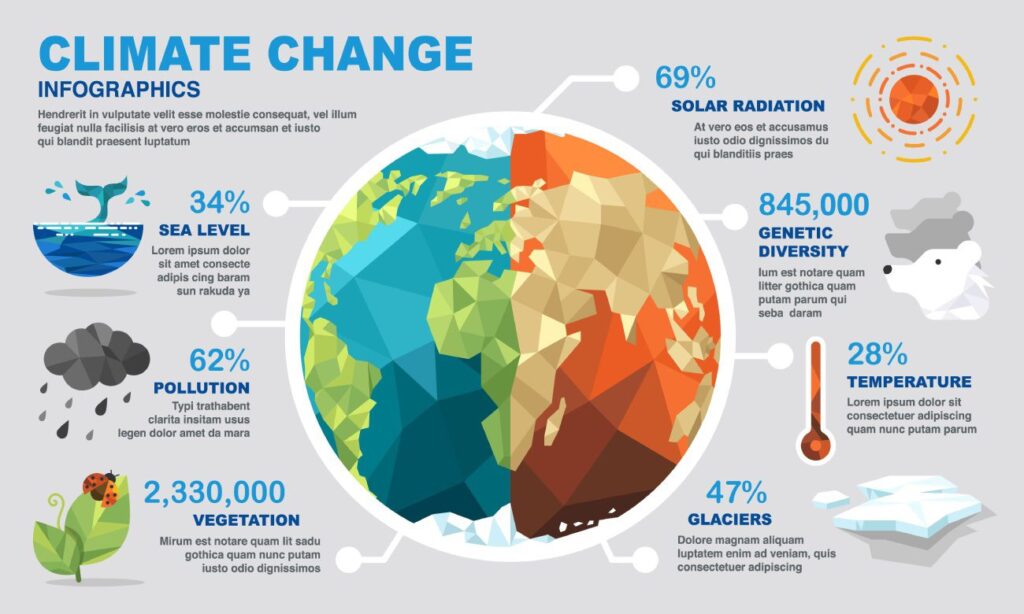
Stakeholders’ post-COP 26-27 reviews
While the Nigerian government fails to acknowledge the security implications of climate change, certain stakeholders, experts, and activists within the country are well aware of the serious threats it poses. Various organisations, including Friedrich Ebert Stiftung (FES) Nigeria, Coalition for Socio-Ecological Transformation (CoSET), Institute for Peace and Conflict Resolution (IPCR), Centre for Civilians in Conflict (CIVIC), Stockholm International Peace Research Institute (SIPRI), Greenwich University, and Office for Strategic Preparedness and Resilience (OSPRE), have organised post-COP events to assess the outcomes and implications of climate change for Nigeria, Africa, and the global south. These discussions have emphasised the direct link between climate change and insecurity in the region.
Verdict from post-mortem analysis: In the aftermath of COP26 in Glasgow, Scotland, and COP27 in Sharm El-Sheikh, Egypt, it became evident that climate change is a significant driver of insecurity in Nigeria and Africa. The gathering of Heads of State and Governments at COP27, under the banner “Together for Implementation,” acknowledged the scientific reports on the present-day and long-term effects of climate change and recognised the severity of the climate emergency. The leaders highlighted the unprecedented and costly catastrophic weather disasters experienced worldwide, particularly impacting vulnerable communities. They called for swift and meaningful implementation of agreements, emphasizing the obligation of every country to fulfill past commitments from the Convention to the Paris Agreement.
Key outcomes and decisions: During COP27, participants expressed concern about the catastrophic effects of the climate crisis on lives and livelihoods globally, particularly in the global south. The conference underscored the importance of cooperation and collaboration between state and non-state parties. A crucial decision was made to establish a global financial system that acknowledges the risk of social and economic instability due to climate change. Parties emphasised the need to avoid burdening nations with unmanageable debt resulting from climate impacts and to reduce the capital cost required for developing nations to achieve a just transition in energy and food systems but not much was referenced on insecurity and conflicts.
Multi-stakeholder consultative forums: In response to these concerns, FES Nigeria, in collaboration with CoSET, organised consultative forums addressing climate change issues related to food sovereignty, human security, armed conflicts, gender, youth development, and inclusivity. During these events held between 2021 and 2023, experts and practitioners highlighted the security challenges posed by climate change, comparing them to the likes of Boko Haram, IPOB, banditry, and kidnapping in Nigeria. Stakeholders amplified the fact that the government’s response to these challenges is too narrow and urged a broader understanding of the interconnectedness between security issues, terrorism, insurgency, militancy, oil extraction, pollution, and climate change.
Calls for improved approaches: Ken Henshaw, Executive Director of We the People, harped that the security challenges across Nigeria, from north to south, are linked to climate change. He stressed the need for the government to recognise the broader implications of its responses to these challenges, including addressing issues of oil extraction, pollution, and climate change. Ms. Dayo Kusa, a gender advocate and conflict expert, called for an improved approach to resolving conflicts between farmers and herders, suggesting that traditional methods of conflict resolution have become outdated.
The security analyst’s perspective: Senator Iroegbu, a security analyst, reiterated that climate change poses a significant security threat to Nigeria including all elements of human security such as health, personal and economic security, but the authorities have yet to fully grasp this reality. He pointed out that many conflicts in the country, whether directly or indirectly, are linked to climate change, environmental degradation, or pollution. He highlighted the annual flooding experienced by states along riverbanks, which leads to the destruction of farmlands, cash crops, and food insecurity, thereby exacerbating security threats. Patrick Okigbo III from Nextier, stressed the importance of a well-functioning governance system in addressing climate change issues. He noted that the state plays a pivotal role in responding to climate change, and if the government’s response is inadequate, the impact of non-state actors is limited.
In a nutshell, the stakeholders’ post-COP 26-27 reviews in Nigeria have shed light on the critical security threats posed by climate change. Despite the government’s lack of attention to this angle, civil society groups such as FES Nigeria, CoSET, IPCR, CIVIC, SIPRI and OSPRE amongst others, have organised events to evaluate the outcomes and implications of climate change for Nigeria, Africa, and the global south. The analysis from these reviews has highlighted the interconnectedness between climate change and insecurity, urging a comprehensive approach to address the challenges. The Nigerian government needs to acknowledge the gravity of climate change as a security threat and incorporate it into its policies and responses. By doing so, they can mitigate the risks, protect vulnerable communities, and ensure a sustainable and secure future for the nation.
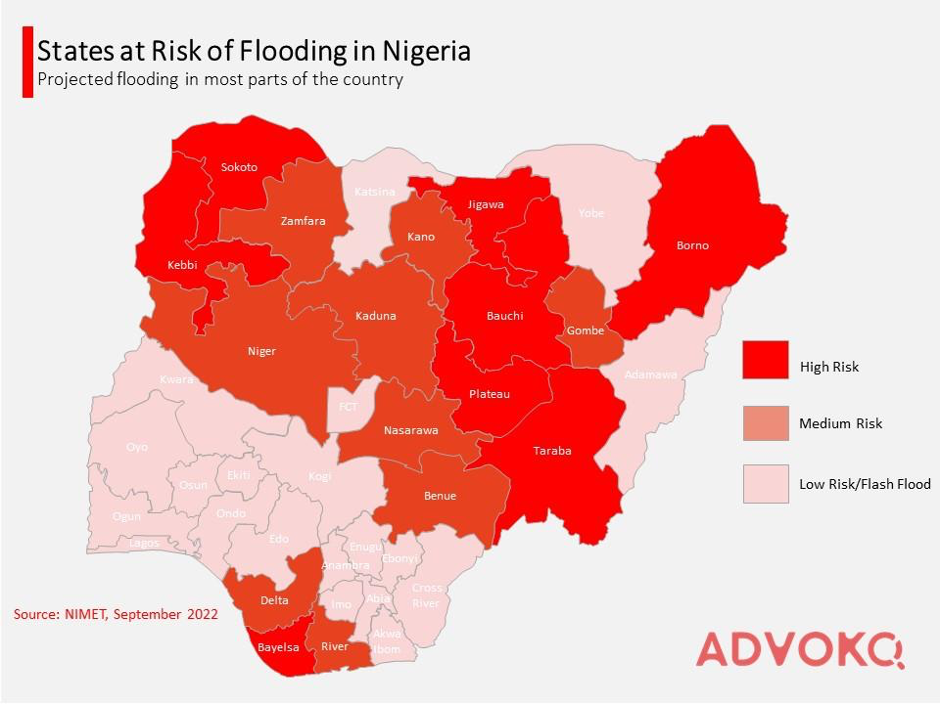
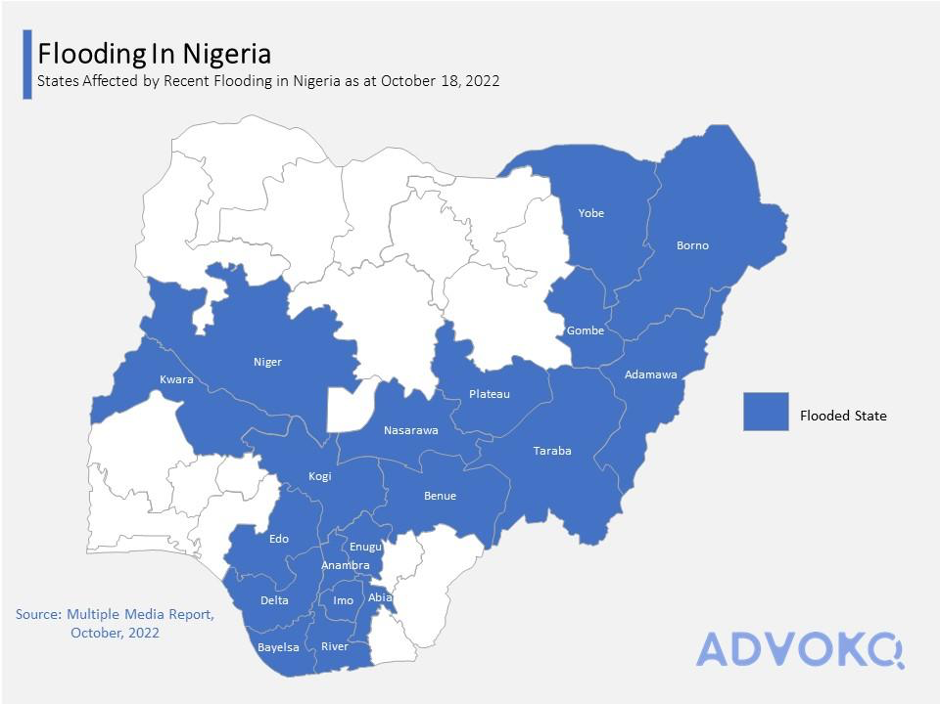
Source: Climate Champions
How climate change is fueling insecurity in Nigeria
As highlighted, the stakeholders in the peace and conflict sector have reached a consensus that climate change is a major driver of insecurity in Nigeria. This was emphasised again at the two-day international dialogue forum in 2022 organised by the Natural Resources Institute at the University of Greenwich. The participants agree that climate change contributes to the persisting insecurity in Nigeria, particularly in conflicts between farmers and herders.
Climate change, conflict, and food insecurity: At the dialogue, the former Director General of IPCR, Bakut Tswah Bakut, noted the relationship between climate change and escalating conflicts across Nigeria, particularly clashes between farmers and herders. Bakut explained that climate change intensifies natural catastrophes and threatens the availability of natural resources through desertification, droughts, floods, and sea-level rise. These environmental changes exacerbate existing tensions, impede economic development, and hinder human rights. According to him, “climate change exacerbates violence by depleting natural resources, such as water and arable land, which are essential for livelihoods”. The conflict expert further stressed that the “adverse impacts of climate change, including droughts, desertification, and shorter rainy seasons, have led to environmental degradation and constrained economic development”.
In the same vein, Prof. Freedom Onuoha from the University of Nigeria further explained the interconnectedness of climate change, conflict, and insecurity. He noted that the increasing incidence of droughts and the subsequent decline in agricultural productivity have severe consequences for livelihoods, particularly in the Northeast region. As people lose their means of livelihood, they become more vulnerable to engaging in criminal activities due to limited opportunities for legitimate income. The negative impacts of climate change on peace and security in Nigeria are evident in the rising number of daily fatalities and the overall deterioration of the country’s conditions.
Impact on women: The increasing effects of climate change, insecurity, and food insecurity also have a severe impact on women. Prof. Joy Ezeilo, the founder of Women Aid Collective (WACOL), highlights the challenges faced by women due to the high cost of cooking gas, which leads to the use of fire. She expressed concern over the disproportionate impact of climate change, insecurity, and food insecurity on women. According to Ezeilo, women bear the brunt of the challenges brought about by climate change, such as the increased cost of cooking gas, leading to a reliance on firewood. This puts them at risk of rape and other forms of violence when fetching firewood in remote areas. Additionally, the competition for arable land has further marginalised women, denying them rightful inheritance and displacing them from their lands. The overall insecurity in the country has also exposed women to kidnapping and sexual violence, leading to unwanted pregnancies and abortions.
There is no gain saying that the convergence of climate change, conflict, and insecurity poses a significant threat to peace and prosperity in Nigeria. The negative impacts on livelihoods, food security, and gender dynamics require urgent attention and comprehensive strategies to address the root causes. The government and relevant stakeholders must recognize the role of climate change in fueling insecurity and prioritize climate adaptation and mitigation measures. Additionally, efforts should be made to empower women and ensure their safety and well-being in the face of these complex challenges.

Climate change as a health security challenge
During one of the post-COP reviews in Nigeria, experts emphasised that climate change poses the greatest threat to human security in the realm of health challenges. Former Minister of Environment, Sharon Ikeazor, highlighted the profound impact of climate change on lives and livelihoods, citing intensifying temperatures, rising sea levels, droughts, storms, and other threats that constantly loom over the world. These effects directly harm human health as they destroy habitats, and present challenges to both humans and the environment. As climate change worsens, it is expected that dangerous weather events will become more frequent and severe.
Nigeria commits to net-zero emission: Speaking at the Post-COP26 meeting by FES Nigeria and COSET in Abuja, Minister Ikeazor, represented by Dr. Iniobong Awe, Director of the Department of Climate Change, noted this reality while explaining the goals of the past conferences. The major commitments include curbing methane emissions that are hazardous to health, halting and reversing deforestation, and aligning the finance sector with a net-zero target by 2050. She disclosed that Nigeria has pledged to achieve net-zero emissions by 2060. To accomplish this ambitious commitment, immediate action is necessary to prevent global warming from exceeding 1.5 degrees Celsius.
Ikeazor stressed the importance of equitable opportunities for Nigerian youth, ensuring a just transition as they shift towards sustainable livelihoods. The government aims to address the challenges faced by young people and ensure that the benefits of a zero-carbon and resilient economy are shared fairly.
Lack of seriousness: On his part, Cadmus Atake-Enade, Project Lead of Fossil Politics, Health of Mother Earth Foundation, expressed concerns about the outcomes of COP meetings. Despite the hope for solutions to the climate crisis since the first Conference of the Parties to the UN Framework Convention on Climate Change (COP-1) in Berlin, there has been a lack of seriousness in tackling the problem. Atake-Enade criticised the Glasgow Climate Pact, describing it as insufficient in terms of climate actions and solutions. He expressed disbelief that climate justice is deemed important only to a select group, suggesting an erosion of the justice basis of the UNFCCC.
Offering a solution, Atake-Enade called for a complete phase-out of all forms of fossil fuels across Africa and globally, promoting real zero provisions rather than net-zero goals. Such a phase-out would contribute to the recovery of the Niger Delta and help prevent catastrophic oil spills like the Aiteo OML 29 oil well blowout.
Dr. Daniel Mann of FES reiterated the damages inflicted by climate change on daily life, particularly for farmers and those engaged in manual labor. In his opening remarks, he noted that the Nigerian government needs to prioritize addressing the issues faced by rural communities, as they are disproportionately affected by the impacts of climate change.
In summary, the discussions highlighted the urgent need to address climate change as a health security challenge. The adverse effects of climate change on human lives, livelihoods, and the environment require immediate action, including a transition away from fossil fuels and a just approach to tackling the climate crisis. Prioritising the needs of vulnerable communities, particularly those in rural areas, is crucial in building resilience and ensuring a sustainable future for Nigeria.

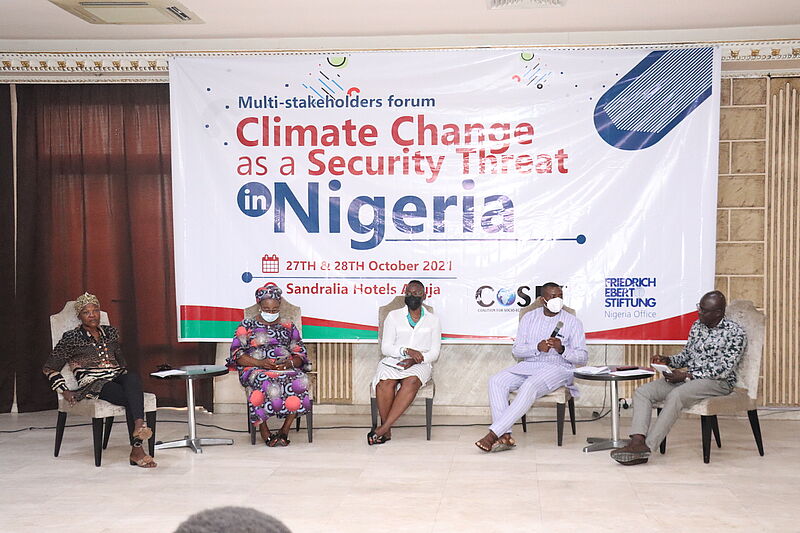


Source: FES Nigeria and Global Sentinel-Senator Iroegbu
Building resilience to climate-related security crises
Experts from CIVIC, SIPRI, and other peacebuilding and security organisations gathered to discuss the pressing issue of climate change and its implications for peace and security in nations. The focus was on brainstorming strategies for building resilience in communities across Nigeria, Africa, and the world to address the challenges posed by climate-related security threats.
Wendy MacClinchy, Director of the United Nations program at CIVIC, highlighted the opportunities for countries to mitigate the impact of climate change by implementing adaptation strategies. She emphasised the importance of building the capacity of communities in traditional resource management to prevent conflicts. Speaking at a virtual webinar on Strengthening Community Resilience to Climate-Related Security Crises organised by the BMW Foundation Herbert Quandt before COP27, MacClinchy noted that some world leaders have recognized climate change as the greatest security threat facing nations today. She pointed out that out of the 25 countries most affected by climate change, 14 are currently experiencing conflicts.
Security forces: MacClinchy underscored how climate change is exacerbating protection challenges for vulnerable individuals and communities, leading to increased risks and complexity. She emphasized the need to involve security forces and the military in climate change response plans, particularly in conflict zones where natural resources are at risk. Building relationships with security forces in these areas and including them in long-term planning efforts can enhance resilience.
Community leaders: MacClinchy also emphasized the importance of supporting community leaders, community protection groups, and giving women leadership roles in resource management. She highlighted the success of women in leadership roles related to water management in Yemen and advocated for their involvement in negotiations and management of water resources. MacClinchy stressed the need to support local leaders, provide education and resources to affected communities, and promote social cohesion and community resilience in the face of resource scarcity and increased demands.
Data protection: MacClinchy suggested the establishment of data protection mechanisms to facilitate coordination and action on climate adaptation, which can be incorporated into local security strategies. She also emphasised the importance of strengthening early warning and rapid response mechanisms through community-based protection groups to detect and respond to threats of attacks.
Inadequate measures: At the international level, MacClinchy called on nations to prioritize the protection of civilians within climate and conflict mitigation and adaptation strategies. Hans Olav Ibrekk, Policy Director for Energy and Climate Change at the Norwegian Ministry of Foreign Affairs, highlighted the inseparable link between lasting security and addressing the climate crisis at the national level. He expressed concern that the assessment and management of climate-related security risks are not keeping pace with the rapidly changing risk landscape. In fragile contexts with low coping capacities, climate change can overwhelm states and societies, increasing the risk of violent instability and conflict. Ibrekk emphasized the interconnectedness of climate change, conflict, displacement, and hunger, which intensify existing risks to economic prosperity, political stability, military readiness, and food, water, and energy security. He stressed the need for systematic inclusion of climate-related factors in political and risk analysis and called for climate-sensitive approaches in both climate action and peacebuilding efforts.
Shared lessons: Katongo Seyuba, a Research Assistant with the SIPRI Climate Change and Risk Programme, shared lessons and experiences from communities that have successfully built resilience. Seyuba highlighted a community in Zimbabwe that adopted a practice of collective food work, pooling labor and resources to enhance food security and create a social safety net against floods and droughts. In terms of conflict prevention and resolution related to natural resources, Seyuba emphasized the importance of social relationships between communities. These relationships facilitate the establishment of customs and rules governing resource sharing and enable community dialogue to reduce the likelihood of violence and build peace. Examples include pastoralists and farmers in Northern Kenya relying on social networks to prevent conflicts over shared territory and agricultural land, and the coastal highlands of Yemen.
He said: “We also see this in the coastal highland of Yemen, where social relationships play a significant role in the implementation of arrangements and rules of managing scarce water resources. “In Ethiopia, social relations facilitate the sharing arrangement between agro-pastoralists and pastoralists for the use of pasture during crops. So, this social relationship and trust between communities is significant in improving adaptation and also reducing conflict risks.”
In a nutshell: Growing threats of climate change to peace and security, requires focusing on building resilience in communities across Nigeria, Africa, and globally. To this end, there is a need to implement adaptation strategies and build the capacity of communities in traditional resource management to prevent conflicts. But to mitigate the impact of climate change on vulnerable populations, the role of security forces and the military in climate change response plans, protection of natural resources, and long-term planning need to be emphasised. There is a need to highlight the importance of supporting community leaders, community protection groups, and empowering women in resource management.
Data protection mechanisms, early warning systems, and community-based protection groups were also proposed as resilience-building measures. Also underscored, is the link between security and addressing the climate crisis, calling for the systematic inclusion of climate-related factors in political and risk analysis. Also shared were successful examples of community resilience, highlighting collective food work in Zimbabwe and the significance of social relationships in preventing and resolving resource conflicts.
Recommendations and Conclusions
Climate change poses a significant security threat at national and personal levels, particularly in the global south. It affects food security, exacerbates conflicts, and undermines economic stability. Recognising and addressing climate change as a security issue requires a collective effort from governments, stakeholders, and individuals worldwide. By integrating climate considerations into national security strategies, promoting renewable energy, and fostering international cooperation, we can mitigate the adverse impacts of climate change and build a more secure and sustainable future for all.
Also, phasing out fossil fuels will give a chance for the rapid deployment of renewable energy sources such as solar, wind, and geothermal power. This transition will not only mitigate the adverse effects of climate change but also improve public health by reducing air pollution and promoting sustainable development.
In addition to the environmental and health impacts, climate change also poses significant economic challenges. The disruptions caused by extreme weather events, such as floods and droughts, can have devastating effects on agriculture, infrastructure, and overall economic stability. Developing countries, especially those in the global south, are particularly vulnerable to these impacts, as they often lack the resources and infrastructure to adapt and recover effectively.
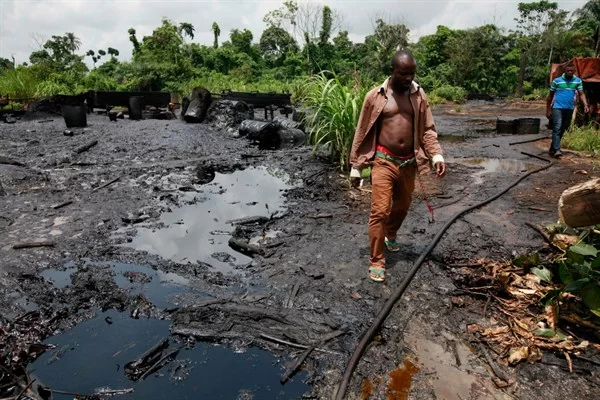
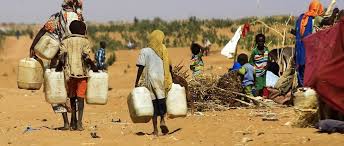
Source: Wathi and ISS Africa
To address these challenges, it is crucial to integrate climate change considerations into national security strategies and policies. Governments should prioritise the development of climate resilience measures, invest in renewable energy infrastructure, and promote sustainable agricultural practices. By doing so, they can reduce the vulnerabilities of communities, enhance food security, and foster economic stability.
Furthermore, international cooperation is essential in tackling climate change as a security threat. The COP conferences provide a platform for global dialogue and collaboration, where nations can share knowledge, experiences, and best practices. It is crucial for developed countries to support developing nations in their efforts to mitigate and adapt to climate change by providing financial and technological assistance.
There is need to also take note of these key recommendations
- Involve security forces and the military in climate change response plans and protection of natural resources.
- Support community leaders, community protection groups, and empower women in resource management.
- Establish data protection mechanisms and integrate climate adaptation into local security strategies.
- Strengthen early warning systems and community-based protection groups for rapid response.
- Prioritise the protection of civilians within climate and conflict mitigation and adaptation strategies.
- Include climate-related factors in political and risk analysis.
- Implement climate-sensitive approaches in climate action and peacebuilding efforts.
- Learn from successful community resilience practices, such as collective food work and social relationships.
In conclusion, building resilience to climate-related security crises requires a multifaceted approach that involves collaboration between communities, security forces, governments, and international organisations. Empowering communities, supporting local leaders, and integrating climate considerations into security strategies are essential for mitigating the impacts of climate change and reducing conflicts. The role of social relationships, data protection mechanisms, and early warning systems cannot be overstated in enhancing resilience. By implementing these recommendations, nations can work towards a more secure and resilient future in the face of climate-related challenges.

